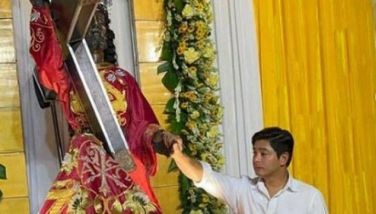Himig Handog: Unanswered questions
July 17, 2002 | 12:00am
It’s music award season once again, time for lyricists, composers, and singer interpreters to rejoice. But rejoice, do they really?
Himig Handog Love Songs Competition, ABS-CBN’s third year in the music competition field, has attracted this year an avalanche of entries, exactly 2135, according to Raffy Tan, head of the Himig Handog Secretariat, compared to 1300 last year, and around 800 the first year.
Tan says the primary reason for this is that unlike the Bayani theme in 2000 and Youth last year, the Love Songs genre seems to be something Filipino composers are very much comfortable with.
Especially since the demise of the much venerated pioneer Metropop Music Competition from their competition GMA Network, ABS is left to solely carry on the chore of seeking out new composers and songs, and provide an avenue for Original Pilipino Music to prosper.
But not a few involved in music are still unhappy; they have many questions in their minds, exclaiming loudly that the Himig competition is not one of excellence in music. Why is this so?
Since the first seven of 10 finalists list came out (Mike Villegas collaborating with Aris Pollisco, Brian Cua with Jason Icasiano, Jimmy Antiporda, Arnold Reyes, Soc Villanueva, Leo Quinito, Arnie Mendaros), and an extension given until July 19 for more entries, questions have been aired.
Why only seven chosen when over 2,000 sent in songs? Does that mean that thousands submitted were below par? And why not just declare seven winners if seven only are deserving? Rankings must have been given entries based on criteria (30 percent harmony, 30 percent lyrics, 40 percent overall impact), and thus there must have been the first 10 entries according to ranking, many ask.
Katha, the composers’ guild through its president Trina Belamide, has come out with a statement protesting the decision stating, "We consider this decision to be distasteful and disrespectful of the songwriters who participated in the contest and submitted their songs on or before the deadline set by ABS-CBN with the understanding that 10 finalists would be chosen from these submitted songs."
The statement decried what it stated was a first "in the history of songwriting contests in this country" and declared that what would have been acceptable was 1) to limit finalists to the seven chosen; or 2) redo the entire contest in order to level the playing field for all.
Of course, defenders of Himig state that given the depressed condition of music and the country in general, musicians should be happy with the lean pickings. Metropop exited from the scene presumably because it could no longer sustain the losses from production and low sales of the Metropop albums. Would we want the same to happen to Himig? After all, the event is still very much a business as a mission. And one knows very well how difficult it is to merge art and business.
We are told that ABS Himig spokespersons have been upfront with their predicament, saying that the contest must sustain itself, produce entries that could be used by their subsidiaries Star Records, ABS-CBN, and Star Cinema as theme songs of their telenovelas and movies.
One observer of the scene says it is time those in music accept that in order to survive, Himig must be commercial in appeal, maintain its artistic integrity while being assured of album sales that will make the idea of the competition sustainable. Perhaps that is also why 10 finalists have to be chosen. Apart from being in the rules of the contest, an album should have at least 10 cuts.
We ourselves feel all this brouhaha would not have occurred had the Himig organizers not announced the seven finalists, and simply extended the deadline until they came up with 10 acceptable entries in terms of commercial appeal. Tan says that if after the July 19 deadline, the 10 slots are still not filled, they will simply keep extending deadlines until they are filled.
One finalist says they felt at a disadvantage with the new decision since their songs were aired and gave new entrants a chance to hear what they were up against. However, he says, after their complaint, Himig stopped airing their songs. It would however be fairer still if they allow all those who submitted previously to rejoin the competition. According to the rules, those who entered the maximum of two songs are prevented from entering again.
This year, some changes have been introduced. Unlike the five major awards in the past, there are only four this year – the grand prize and three choice awards: Listener’s, Texter’s, and Buyer’s. The grand prize cash award has been brought down from P500,000 to P200,000 but each finalist this year will get P50,000 up from P20,000 and in prior years. The Grand Prize winner relinquishes his copyright to the song for the next five years and is banned from entering the competition for the next three years. This is to give more chances to other composers, says Tan. Among the seven finalists this year are three former finalists Mike Villegas, Arnold Reyes, and Jimmy Antiporda.
Whatever the results of this controversy, it still remains that Himig is the only music competition in the country giving composers the limelight, as opposed to singers’ competitions. Their rules may be unorthodox by standards, says one who entered the competition, but we have to understand that, after all, it is their competition, and they can do with it as they please. We also must look at the entire scenario, he says, from the overall perspective of the music industry in its doldrums, beset by piracy and a myriad other problems, and understand that if the decisions made are abnormal, it is also because we are living today in abnormal times.
(Email the author at [email protected])
Himig Handog Love Songs Competition, ABS-CBN’s third year in the music competition field, has attracted this year an avalanche of entries, exactly 2135, according to Raffy Tan, head of the Himig Handog Secretariat, compared to 1300 last year, and around 800 the first year.
Tan says the primary reason for this is that unlike the Bayani theme in 2000 and Youth last year, the Love Songs genre seems to be something Filipino composers are very much comfortable with.
Especially since the demise of the much venerated pioneer Metropop Music Competition from their competition GMA Network, ABS is left to solely carry on the chore of seeking out new composers and songs, and provide an avenue for Original Pilipino Music to prosper.
But not a few involved in music are still unhappy; they have many questions in their minds, exclaiming loudly that the Himig competition is not one of excellence in music. Why is this so?
Since the first seven of 10 finalists list came out (Mike Villegas collaborating with Aris Pollisco, Brian Cua with Jason Icasiano, Jimmy Antiporda, Arnold Reyes, Soc Villanueva, Leo Quinito, Arnie Mendaros), and an extension given until July 19 for more entries, questions have been aired.
Why only seven chosen when over 2,000 sent in songs? Does that mean that thousands submitted were below par? And why not just declare seven winners if seven only are deserving? Rankings must have been given entries based on criteria (30 percent harmony, 30 percent lyrics, 40 percent overall impact), and thus there must have been the first 10 entries according to ranking, many ask.
Katha, the composers’ guild through its president Trina Belamide, has come out with a statement protesting the decision stating, "We consider this decision to be distasteful and disrespectful of the songwriters who participated in the contest and submitted their songs on or before the deadline set by ABS-CBN with the understanding that 10 finalists would be chosen from these submitted songs."
The statement decried what it stated was a first "in the history of songwriting contests in this country" and declared that what would have been acceptable was 1) to limit finalists to the seven chosen; or 2) redo the entire contest in order to level the playing field for all.
Of course, defenders of Himig state that given the depressed condition of music and the country in general, musicians should be happy with the lean pickings. Metropop exited from the scene presumably because it could no longer sustain the losses from production and low sales of the Metropop albums. Would we want the same to happen to Himig? After all, the event is still very much a business as a mission. And one knows very well how difficult it is to merge art and business.
We are told that ABS Himig spokespersons have been upfront with their predicament, saying that the contest must sustain itself, produce entries that could be used by their subsidiaries Star Records, ABS-CBN, and Star Cinema as theme songs of their telenovelas and movies.
One observer of the scene says it is time those in music accept that in order to survive, Himig must be commercial in appeal, maintain its artistic integrity while being assured of album sales that will make the idea of the competition sustainable. Perhaps that is also why 10 finalists have to be chosen. Apart from being in the rules of the contest, an album should have at least 10 cuts.
We ourselves feel all this brouhaha would not have occurred had the Himig organizers not announced the seven finalists, and simply extended the deadline until they came up with 10 acceptable entries in terms of commercial appeal. Tan says that if after the July 19 deadline, the 10 slots are still not filled, they will simply keep extending deadlines until they are filled.
One finalist says they felt at a disadvantage with the new decision since their songs were aired and gave new entrants a chance to hear what they were up against. However, he says, after their complaint, Himig stopped airing their songs. It would however be fairer still if they allow all those who submitted previously to rejoin the competition. According to the rules, those who entered the maximum of two songs are prevented from entering again.
This year, some changes have been introduced. Unlike the five major awards in the past, there are only four this year – the grand prize and three choice awards: Listener’s, Texter’s, and Buyer’s. The grand prize cash award has been brought down from P500,000 to P200,000 but each finalist this year will get P50,000 up from P20,000 and in prior years. The Grand Prize winner relinquishes his copyright to the song for the next five years and is banned from entering the competition for the next three years. This is to give more chances to other composers, says Tan. Among the seven finalists this year are three former finalists Mike Villegas, Arnold Reyes, and Jimmy Antiporda.
Whatever the results of this controversy, it still remains that Himig is the only music competition in the country giving composers the limelight, as opposed to singers’ competitions. Their rules may be unorthodox by standards, says one who entered the competition, but we have to understand that, after all, it is their competition, and they can do with it as they please. We also must look at the entire scenario, he says, from the overall perspective of the music industry in its doldrums, beset by piracy and a myriad other problems, and understand that if the decisions made are abnormal, it is also because we are living today in abnormal times.
(Email the author at [email protected])
BrandSpace Articles
<
>
- Latest
- Trending
Trending
Latest
Trending
Latest
Recommended
January 10, 2025 - 12:00am































